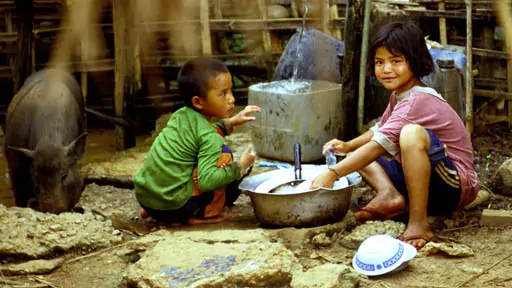Indigenous Calendar July, 2012: Akha Children Don't Read Warning Labels

Except for the few remaining, uncontacted peoples, the world is a changing place for all of us. For the developed and developing worlds the changes range from technology to geopolitics; we can use our connected, smart, mobile devices to find out instantly the latest developments in global climate change from half a world away. And we can use those same devices to discuss those developments on the Internet with people half a world away.
For the world's indigenous people the world is also changing but in different ways. For some, the writing of their language for the first time in their history is the new technology. For others it is formal education. Others are discovering that tourists are, for reasons they don't always understand, interested in them. Still others are beginning to live in houses made of bricks and mortar instead of their ancestral, mud-and-straw houses. Perhaps the most significant single change is one that brings with it many others: electricity.
In northern Thailand, and other parts of Southeast Asia, the Akha are among those indigenous peoples undergoing significant change today. At their time of origin the Akha would have used the leaves of natural plants to serve as their plates and would have used their fingers to serve as their knives, forks and spoons. Some of them still do.
I visited a small Akha village in northern Thailand in 1999. The village shaman agreed to a private audience with me and my guide during which I learned many things about his village, his people and their heritage. I attempted to ask him about the changes that his people were facing. It was perhaps because he didn't want to discuss the topic or it was perhaps because his ability in the Thai language was beyond what my guide was translating; or it may have been that he just wanted me to see the answer for myself. In any case he made it clear that I was welcome to stay in his village as long as I wanted to and to look around as much as I wanted to.
Of all the observations I'd made in such villages there was one that had not struck me as a change: the practice of basic hygiene. I'd seen people brush their teeth, shampoo their hair and wash with soap — albeit using water from a well or a river. Seeing people washing their modern dishes with detergent had also not struck me as evidence of change.
Then I saw these two children washing dishes in a pig pen. That's when I realized that the people who write the warning labels on their products don't consider every context in which their product might be used.
The Akha are featured in our documentary, Indigenous Peoples of Southeast Asia.
If you enjoyed reading this article, please consider supporting independent, advertising-free journalism by buying us a coffee to help us cover the cost of hosting our web site. Please click on the link or scan the QR code. Thanks!


